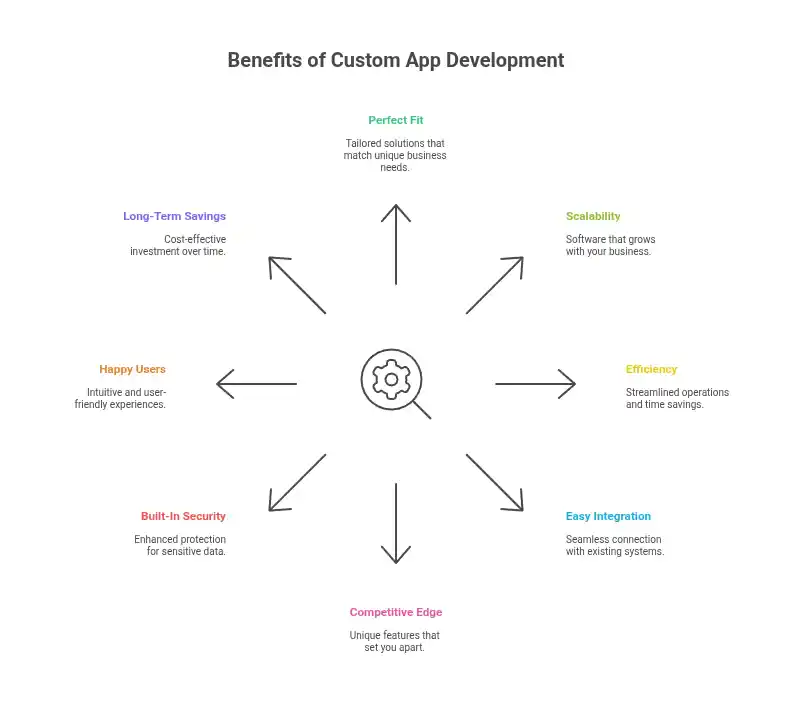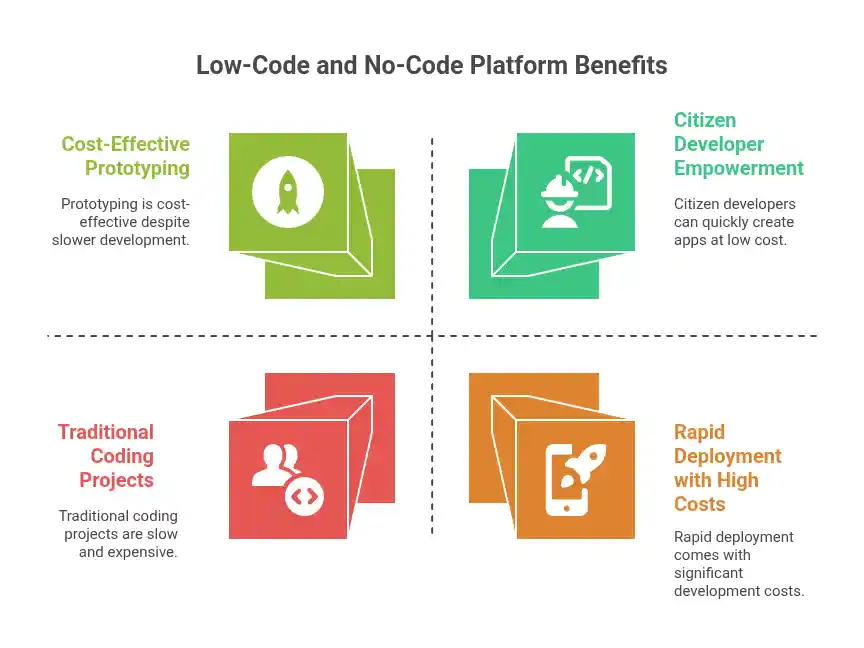Table of Contents
Have you ever wished your business software could do exactly what you need, instead of making you work around its quirks? Maybe you’re tired of “one-size-fits-all” tools that feel like they’re designed for someone else. Or perhaps you’re wondering what “custom application development” even means and if it’s too complicated or expensive for your business to grow. Well, you’re in the right place!
Let’s explore how custom application development can be a game-changer for businesses like yours.
What Exactly Is Custom Application Development?
Think about it like this: When you need a new home, you could buy one that’s already built. It’s fast and often cheaper upfront. But maybe it doesn’t have that dream kitchen, the perfect home office, or enough space for your growing family. That’s a bit like buying “off-the-shelf software” – it’s a ready-made solution for many businesses, but it might not fit your unique style or needs perfectly.
Custom application development, on the other hand, is like designing and building your house from scratch. You get to choose everything: the layout, the materials, and all the features that fit your life perfectly. This means software that is made especially for your business. It’s designed to solve your specific problems, make your daily work smoother, and fit right into what you already do. These applications aren’t sold to everyone; they’re built just for you and your team.
This process involves careful planning, building, and making sure the app does exactly what you need it to. It’s about creating tools that are interactive and dynamic, meaning they can change and respond to what you do. Instead of just showing information, custom web application development, let you perform tasks like managing customer information, tracking inventory, or handling projects.
Why Choose Custom Apps?
So, why go through the effort of building something custom? Custom application development offers some powerful advantages that can truly help your business grow and stand out.

Perfect Fit
Imagine having a tool that fits your unique business like a glove. Custom applications are built to match your exact workflows and needs. This means no more wasted time on features you don’t use or trying to force a generic tool to do something it wasn’t designed for. For example, a shipping company could get a custom app for real-time updates and detailed reports, far beyond what a basic off-the-shelf tool might offer.
Not for Custom Apps! (Scalability)
As your business gets bigger, your software needs to grow with it. Off-the-shelf software might require expensive upgrades or even a complete replacement when your needs change. But custom applications are built with growth in mind. They can handle more users, more data, and new features as your business expands, without you needing to start from scratch.
Boosting Efficiency
Custom applications can automate those repetitive, time-consuming tasks that slow your team down. By streamlining daily operations, you save time and reduce mistakes. For instance, a finance company saved hundreds of hours each year by using a custom app to automate how it welcomes new clients. This frees up your team to focus on more important work.
Easy Integration
Most businesses already use many different software tools. Custom apps are designed to connect smoothly with the systems you already have, even older ones. This means all your tools can “talk” to each other, sharing information and creating a more unified workflow. You won’t have to manually move data between different programs, which can be a huge time-saver and reduce errors.
A Competitive Edge
What if your business could do something your competitors can’t? Custom application development gives you unique features tailored to your strategy. This helps you stand out in the market, offer better services, and keep ahead of the competition.
Built-In Security
Security is super important, especially when handling sensitive information. While generic software has general security, custom applications can be built with your specific security needs from the very beginning. This reduces risks like data breaches and unauthorized access, keeping your information safer.
Happy Users, Happy Business
Whether it’s your employees using internal tools or your customers accessing your services, a smooth and easy experience is key. Custom software can be designed to be very intuitive and user-friendly, tailored to how your specific users think and work. This leads to higher satisfaction, more engagement, and better adoption rates for your tools.
Save Money in the Long Run
While custom application development might require a bigger investment upfront compared to some off-the-shelf options, they often save money over time. You avoid paying for unnecessary features, costly add-ons, or repeated licensing fees. Plus, because they can grow with your business, you won’t need to replace them frequently, making them a smart long-term investment.
How Are Custom Apps Brought to Life?
A custom application development might sound daunting, but it generally follows a clear path:
- Define the Problem: First, you figure out exactly what problem your app needs to solve. This is your “North Star” that guides the whole project.
- Plan and Design: You’ll map out how the app will work, creating simple sketches or “wireframes” to show what it will look like and how users will move through it.
- Get Feedback: You’ll share these early designs with potential users to get their thoughts. This helps make sure the app will actually be useful and easy to use before too much work is done.
- Choose Your Tools: Based on your needs, you pick the right “firepower”—the programming languages, frameworks, and platforms that will be used to build your app.
- Build It!: This is where the magic happens. Developers write the code for the “front end” (what users see) and the “back end” (the brains behind the scenes, like databases and servers).
- Test, Test, Test: Before anyone uses it, the app goes through lots of testing to find and fix any bugs or issues. You check everything from how it works to how secure it is and if it performs well.
- Launch and Deploy: Once it’s ready, the app is “deployed” or put onto servers so users can access it, uwsually just by visiting a web address.
- Maintain and Improve: The process doesn’t stop after launch! You’ll keep an eye on how the app is doing, fix any new issues, and add updates or new features as needed to keep it running smoothly and effectively.
Low-Code and No-Code Solutions
In the past, building custom apps often meant needing skilled coders and lots of time and money. But today, there’s an exciting development that makes custom application development much more accessible: low-code and no-code platforms.

These platforms are like modular building kits for your custom “house”. They use visual tools and pre-built parts, so you can drag and drop elements to create your app without writing tons of code. This means:
- Faster Development: Apps can be built much quicker, sometimes in days instead of months.
- Lower Costs: Less custom coding often means reduced development expenses.
- Empowering Your Team: Even people who aren’t traditional programmers can create the apps they need for their teams, sometimes called “citizen developers”.
Platforms like Budibase and Tadabase are examples of these tools, handling the “backend” (server, database) and “frontend” (user interface) parts for you, making it much easier to bring your ideas to life. While they might have different costs or levels of flexibility compared to coding from scratch, they offer a powerful way for businesses to get the custom solutions they need quickly.
Ready to Build Your Business’s Future?
Custom application development isn’t just for huge companies with massive budgets. With new tools and approaches, it’s becoming a smart, accessible way for any business to get software that truly fits its needs and helps it grow. By tailoring your tools, you can boost efficiency, scale easily, gain an edge over competitors, and provide a fantastic user experience.
So, if you’re feeling held back by generic software, maybe it’s time to build your custom solution. The future is bright for businesses that embrace tools made just for them! What kind of custom app do you think would help your business grow the most? Share your ideas in the comments below!
FAQs
Q1. What is custom application development?
Custom application development is the process of creating software tailored to the specific needs and workflows of a business. Unlike off-the-shelf solutions, which are designed for the mass market, custom application development, are to solve unique problems and enhance operational efficiency for a particular organization.
Q2. How long does it take to develop a custom application?
The timeline for a custom application development can vary significantly based on the complexity of the project, the features required, and the resources available. Generally, it can take anywhere from a few weeks to several months to complete, including planning, development, testing, and deployment.
Q3. Is custom application development expensive?
While the upfront investment for custom applications may be higher than some off-the-shelf solutions, they often prove to be cost-effective in the long run. Customized software can save money by eliminating unnecessary features, reducing licensing fees, and growing with your business, thereby avoiding frequent replacements.
Q4. Can custom applications integrate with existing software?
Yes, custom applications are designed to integrate smoothly with the existing tools and systems that a business already uses. This seamless integration helps create a unified workflow by allowing different software to communicate and share data without manual input, saving time and minimizing errors.
Q5. What security features can custom applications offer?
Custom applications can be developed with specific security measures tailored to a business’s unique needs. This includes advanced data protection protocols, user authentication, and access controls aimed at reducing risks associated with data breaches and unauthorized access.